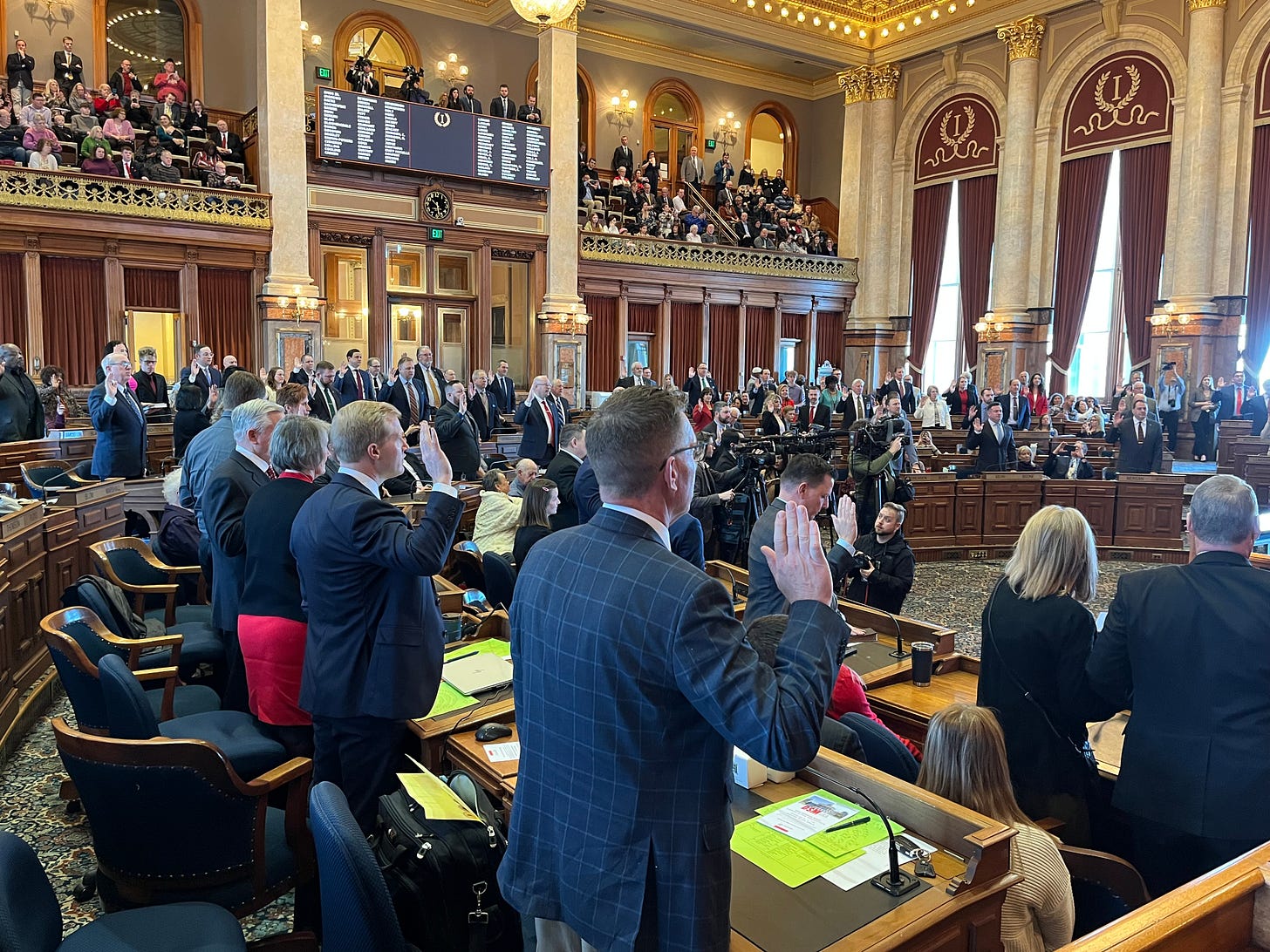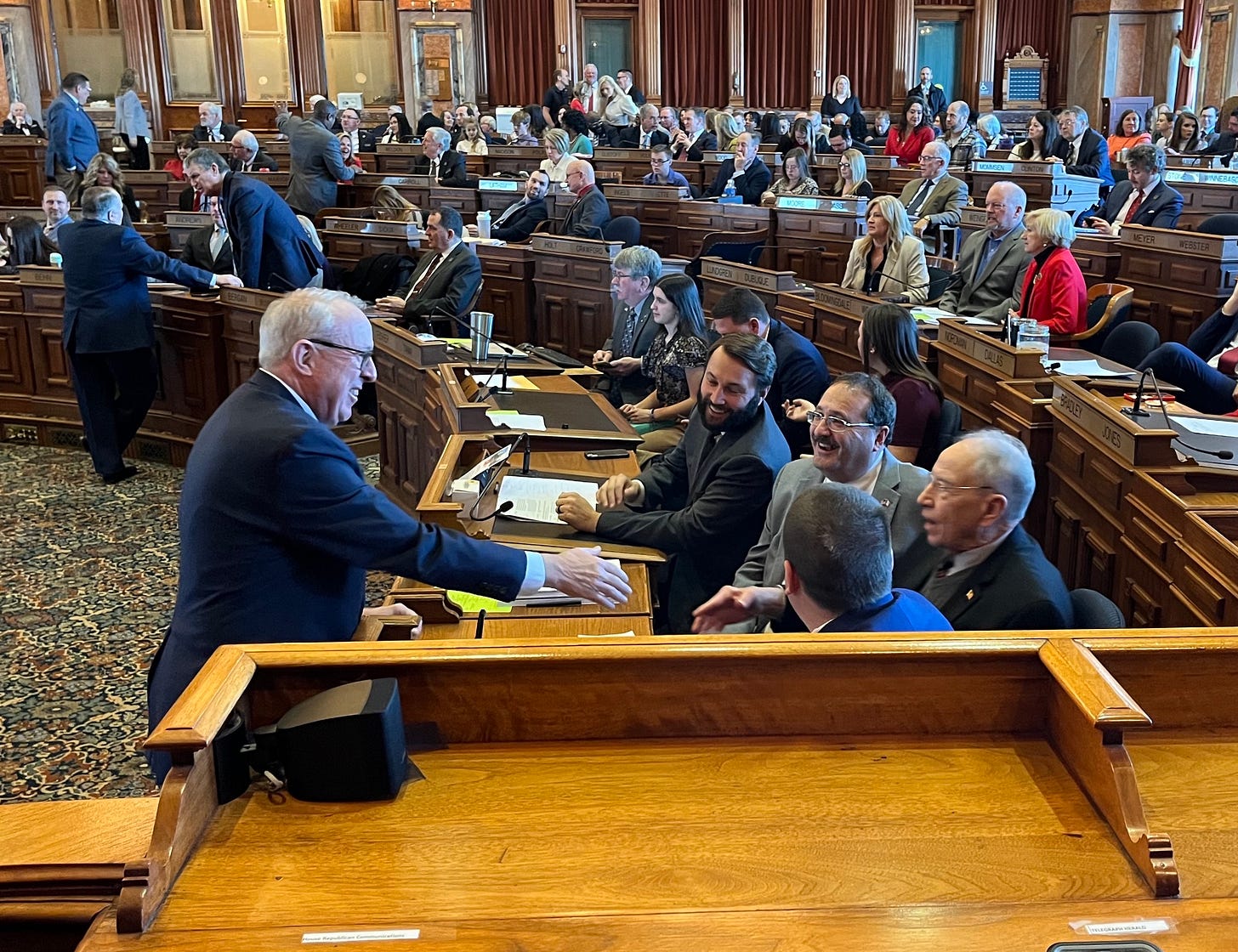Monday was an exciting day for members of the Iowa House and Senate, and also for me. Although I’ve closely followed legislative happening since the early months of Bleeding Heartland’s existence in 2007, this was the first time I was able to watch the opening proceedings from the Iowa House press bench. The Institute for Free Speech filed a federal lawsuit on my behalf a couple of weeks into the 2024 session, so I didn’t receive credentials to sit in the media area until late January.
If you’re looking for other Iowa legislative content this week, check out
and ’s recent interview with Democratic State Representative Sean Bagniewski on the podcast, and ’s interview with Iowa Senate Minority Leader Janice Weiner on .On to the January 13 edition of our live radio show. Spencer and I tried to pack in as much information as we could. The audio file is at the top of this email, or you can find “KHOI’s Capitol Week” on any podcast platform or smart speaker. The full archive (going back to February 2021) is available on KHOI’s website.
Iowa legislature gets to work
We talked about what happened on the opening day, starting with the swearing in. Many lawmakers bring family members. I walked over to the press bench on the other side of the chamber to take this picture of Democratic State Representative Kenan Judge reaching out to shake U.S. Senator Chuck Grassley’s hand. The senator’s grandson, House Speaker Pat Grassley, is seated to his left. To his right are Republican State Representative Bobby Kaufmann (the chair of the House Ways and Means Committee) and his father, Iowa GOP state chair Jeff Kaufmann.
Having watched some suspenseful speaker elections in the U.S. House, the Iowa legislative votes on officers are anticlimactic. Following a longstanding tradition, members of the minority party join their counterparts in unanimously electing the Iowa House speaker and Senate president.
Watching the seat assignment process was fascinating. It’s done by seniority, with lots drawn for legislators who were first elected in the same year. Long-serving typically stay in the seats they picked last session, but we watched some second- or third-term House members take several minutes to decide whether to choose a different desk for the next two years. Some people like to be in the back row or on the aisle, for more space. Others may prefer to be close to the press bench or the “well” in the front of the chamber.
We touched on highlights from the opening day speeches. House Speaker Grassley, Senate Majority Leader Jack Whitver, and Senate President Amy Sinclair touted the big wins for Republicans up and down the ballot as proof Iowans support what they’ve been doing. I mentioned some other factors that help explain the state’s sharp move to the right—though it’s certainly true that Iowans have not punished Republicans for policies the GOP trifecta has enacted.
Whitver thanked those who have supported and prayed for him as he has battled a brain tumor over the past year. He said, “The news recently has been encouraging: The tumor is getting smaller.” I am sending healing thoughts for a full recovery.
Iowa House leaders created two new committees this year, to deal with federal funds and higher education. We talked about what that means and why it matters.
Top Democratic lawmakers laid out their goals for the 2025 session. House Minority Leader Jennifer Konfrst and Senate Minority Leader Janice Weiner called for work to lower the cost of living, create good jobs, and make housing and child care more affordable. Weiner also said the legislature should tackle wage theft and illegal employee misclassification; Common Good Iowa has found those practices cost Iowa workers hundreds of millions of dollars.
Konfrst and Weiner also appealed to Republicans to work on legislation in a bipartisan way. Konfrst said, “Iowa House Democrats are proud to represent more than a million Iowans, and indirectly we represent each and every Iowan too. They all deserve a seat at the table and we will work to ensure that they have it.”
On a related note, both Konfrst and Weiner took questions from statehouse reporters at the Iowa Capitol Press Association’s legislative forum last week. For the third straight year, Republican leaders and Governor Kim Reynolds skipped the forum (a decades-long tradition in Iowa).
Spencer and I flagged some important dates for the legislature's work. If all goes according to plan, the House and Senate will be ready to adjourn on May 2. Most years, they go into overtime.
Hot topics for the Iowa legislature’s work this year
We spent several minutes talking about some of the controversial issues the legislature will tackle, starting with property taxes. Many Iowans have complained about property tax hikes, and the property tax bill lawmakers rushed to pass near the end of the 2023 session is causing some problems for local government.
Speaker Grassley said he “will encourage this chamber to prioritize certainty for the taxpayers over certainty for the taxing entities.” That sounded to me like a warning he will not defer to the concerns of city and county leaders. Konfrst and Weiner (a former Iowa City council member) said last week that local government should have a seat at the table as the legislature considers more property tax changes.
Grassley mentioned several issues relating to children during his opening remarks. We’ll surely hear more about one of them (restricting cell phone use in schools) when Governor Reynolds delivers her Condition of the State speech Tuesday evening. The House speaker also wants “a comprehensive look at improving our foster care system and adoption systems.” Last year, House members unanimously approved an expanded adoption tax credit; for some reason, the Senate never took up that bill.
The Cedar Rapids Gazette reported on a bill coming soon to impose a five-year casino moratorium. Legislators have to act fast, because the state’s Racing and Gaming Commission is schedule to vote on a proposal for a Linn County casino in early February.
We talked about prospects for new bills limiting eminent domain or access to land by pipeline surveyors. I don’t see anything along those lines getting through the Iowa Senate, where the new Commerce Committee chair (Mike Bousselot) has helped bury eminent domain bills before.
More than 25 organizations formed a coalition in December to ask lawmakers to pass a “comprehensive hands-free driving bill.” I’m skeptical that this will go anywhere, after many failed attempts to pass something similar since 2017. But if the Iowa legislature could pass a new bottle bill in 2022, legalize raw milk sales in 2023, and regulate traffic cameras in 2024, maybe this will be the year for Iowa to prohibit drivers from holding mobile devices.
Since our listeners tend to be highly engaged in political news, I touched on some features of the official Iowa legislative website. I encourage you to dive in so you can more easily follow what’s happening in committees or on the House and Senate floor.
Demographics and diversity in the legislature
Since around 2010, I’ve closely followed the changes in representation for various groups in the House and Senate. We discussed some of those trends. The Cedar Rapids Gazette’s Erin Murphy wrote about the advance of the millennials in the House and the resurgence of Baby Boomers in the Senate. As a proxy for those changes, I keep an eye on the post popular first names in each chamber. There’s been a big decline in Boomer names like Gary, Mark, Mary, and Linda, and an increase in “younger” names like Austin, Heather, Zach, and Megan.
We talked about the decline in women’s representation in both chambers. I covered that in more detail at Bleeding Heartland.
As for racial, ethnic, and religious diversity, the 2024 elections were a mixed bag. This Bleeding Heartland article walks through the changes.
Following a campaign with a record number of LGBTQ candidates, the Iowa legislature now has more out LGBTQ members than ever before. I profiled State Representative Aime Wichtendahl, the Democrat who became Iowa’s first transgender lawmaker.
For people who are used to almost everyone in government looking like them, it’s easy to discount so-called “identity politics.” I wanted to explain why representation matters for groups that traditionally haven’t had much political power in Iowa.
News about politically relevant lawsuits
We had just a few minutes near the end fo the show to talk about news from outside the statehouse. Last week the League of United Latin American Citizens of Iowa dismissed its legal challenge to some voting restrictions the state enacted in 2021. You can read more about that in the Des Moines Register.
Also last week, the free speech group known as FIRE (short for the Foundation for Individual Rights and Expression) announced that it will defend the Des Moines Register’s longtime pollster Ann Selzer pro bono. President-elect Donald Trump and a Register subscriber are (absurdly) suing Selzer and the Register under Iowa’s consumer fraud statute.
Thank you for reading and listening! I’m off to cover some Iowa House and Senate committee meetings.






Thank you for a very interesting and informative read.
Questions though:
1) I need to be informed of how to 'lower cost of living'?
2)What are 'good jobs'?
3) What is 'affordable' housing and child care? For me the word AFFORDABLE is the most misleading political word today. Affordable to who? How is affordable decided? Affordable is different to u and to me. And I can only imagine how many thousand pages it would take to make a law deciding 'what is affordable' to everyone. Without a doubt, in my opinion, it would be another bureaucratic boondoggle. I thoroughly support the idea of people being able to work child care and housing into to their budgets. I've been involved with people, has been couples mind u, to adjust their budgets and then are able to have one stay home and raise their children themselves.
Thanks again,
Rich Win Iowa’s Culture War
When I started in the legislature, lo those many moons ago, we developed a bipartisan, bicameral consensus based on the principle that property taxes should pay for property-related services. We also recognized that they were particularly regressive for people on fixed incomes, especially retirees.
But Reynolds and her culture warriors are now propelling us in a race that only the rich can win. Income tax cuts, a soft farming economy (with ag land prices at $20,000 per acre), ongoing expenses paid with one-time federal money that’s now running out, and private school subsidies are putting Iowa in a $700 million hole for the next fiscal year.
Rather than halting revenue declines, she and the GOP are going to accelerate them. At the current rate, budget deficits of $900 million are in the offing for FY27, and $1 billion for FY28. Our emergency and reserve funds will be drained within five years.